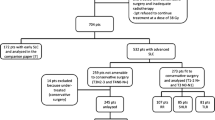Abstract
The aim of this study was to verify the oncological and functional outcome of conservative surgical treatment of primary supraglottic squamous cell carcinoma (SGSCC) and related neck disease in order to verify the effectiveness of supraglottic laryngectomy (SL) and the validity of an “observation” policy in the control of clinically negative (N0) necks. Of a total of 252 consecutive patients affected by primary SGSCC seen between 1975 and 1990 at the Department of Otolaryngology of the University of Perugia (1975–1987) and the Catholic University of the Sacred Heart of Rome (1988–1990), a subset of 132 patients treated with classical SL was evaluated after presenting sufficient clinicopathological data and a follow-up period of at least 5 years. Tumors were staged according to the 1992 UICC TNM classification and grouped into stages I-II (n = 94) and III-IV (n = 38). Comprehensive neck dissections were performed only in the clinically positive (N+) necks (25/132 cases), while in the clinically N0 ones (107/132 cases) an “observation” policy under strict follow-up conditions was adopted. After primary surgery, the 5-year relapse-free survival (RFS) was 74%. The RFS was 80% for T1-2 disease and 65% for T3. The RFS was 80% for stages I-II tumors and 71% for stages III-IV. The actual 5-year overall survival (OS) was 89% for T1-T2 tumors and 67% for T3 disease or 93% for stages I-II and 69% for stages III-IV. The OS was 89% for N0 neck and 73% for N+. The 5-year-metastasis-free survival (MFS) was 83% for N0 patients, 74% for N+, 84% for T1-T2 N0, 71% for T1-T2 N+, 81% for T3 N0 and 68% for T3 N+. In all, SL was found to be highly effective in the management of primary SGSCC. In the presence of clinically N0 neck “observation” under strict follow-up with therapeutic comprehensive neck dissection for delayed nodal recurrence, SL was suitable for controlling the neck cancer, as well as for salvaging recurrent disease. Bilateral elective, selective or functional neck dissection in every instance of supraglottic cancer was best performed only in those SGSCC patients who were more likely to have occult nodal disease on the basis of biological factors and imaging data.
Similar content being viewed by others
Author information
Authors and Affiliations
Additional information
Received: 26 September 1998 / Accepted: 22 February 1999
Rights and permissions
About this article
Cite this article
Maurizi, M., Paludetti, G., Galli, J. et al. Oncological and functional outcome of conservative surgery for primary supraglottic cancer. European Archives of Oto-Rhino-Laryngology 256, 283–290 (1999). https://doi.org/10.1007/s004050050247
Issue Date:
DOI: https://doi.org/10.1007/s004050050247




